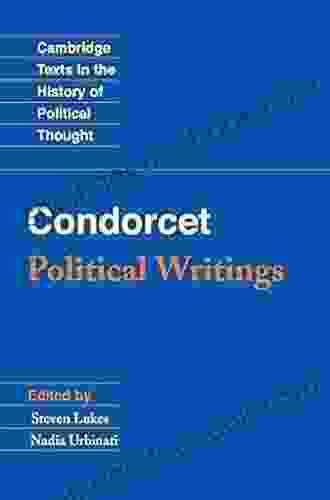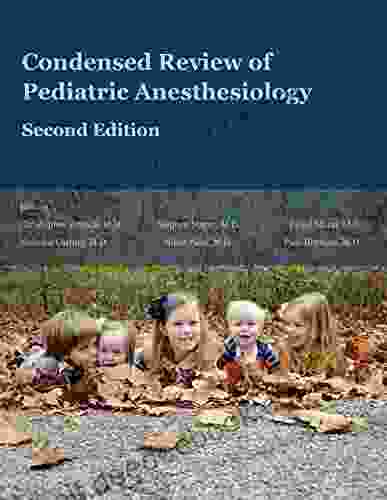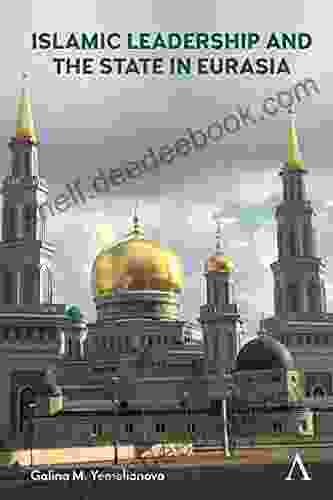Islamic Leadership and the State in Eurasia: A Historical Perspective

Eurasia, a vast and culturally diverse region, has witnessed a profound relationship between Islamic leadership and the state throughout history. From the rise of the Umayyad Caliphate in the 7th century to the establishment of the Ottoman Empire in the 13th century and the Soviet Union in the 20th century, Islamic law and political thought have played a significant role in shaping the governance and social structures of this region. This article explores the complex and multifaceted relationship between Islamic leadership and the state in Eurasia, examining historical precedents, key concepts, and contemporary challenges.
Historical Precedents
4 out of 5
| Language | : | English |
| File size | : | 9330 KB |
| Text-to-Speech | : | Enabled |
| Screen Reader | : | Supported |
| Enhanced typesetting | : | Enabled |
| Print length | : | 286 pages |
Umayyad Caliphate (661-750 AD)
The Umayyad Caliphate, founded by the Umayyad clan of Mecca, established a centralized Islamic empire that stretched from Spain in the west to Central Asia in the east. The caliph, the political and religious leader of the empire, wielded absolute authority over all aspects of governance. Islamic law (Sharia) became the basis for the legal system, and the state actively promoted the spread of Islam.
Abbasid Caliphate (750-1258 AD)
The Abbasid Caliphate, established by the Abbasid clan of the Prophet Muhammad's uncle, Abbas ibn Abd al-Muttalib, continued the Umayyad tradition of centralized rule and Islamic law-based governance. However, the Abbasids also introduced a more bureaucratic and professional administration, which allowed for greater efficiency and stability.
Ottoman Empire (1299-1922 AD)
The Ottoman Empire, established by the Oghuz Turkic tribe, emerged as a major Islamic power in Eurasia. The Ottoman sultan, the political and religious leader of the empire, ruled with absolute power. Islamic law and tradition played a central role in Ottoman governance, particularly in family law, inheritance, and religious affairs.
Soviet Union (1922-1991 AD)
The Soviet Union, a communist state founded on Marxist-Leninist ideology, pursued a policy of secularism and atheism. While Islam was tolerated as a personal belief, any overt expression of religious authority or leadership was suppressed. The state actively promoted secularization and sought to eradicate traditional Islamic institutions.
Key Concepts
The Caliphate
The caliphate is a form of Islamic governance in which a single leader, the caliph, holds both political and religious authority. The caliph is considered the successor to the Prophet Muhammad and is responsible for upholding Islamic law and tradition. Historically, the caliphate has been a central institution in Islamic societies, providing a framework for governance, unity, and the spread of Islam.
Islamic Law (Sharia)
Sharia, the Islamic legal system, is derived from the Quran, the Hadith (the sayings and actions of the Prophet Muhammad),and ijtihad (interpretive reasoning). Sharia governs all aspects of Muslim life, including worship, family law, economics, and criminal justice. In Islamic states, Sharia is typically the basis for the legal system and is used to guide judicial decisions.
Religious Authority
Religious authority in Islamic societies is typically vested in religious scholars known as ulema. The ulema play a crucial role in interpreting Islamic law, issuing fatwas (religious edicts),and providing guidance on religious matters. In some Islamic states, the ulema have significant influence on governance, advising rulers and shaping public policy.
Contemporary Challenges
Secularism and Nationalism
In recent decades, secularism and nationalism have posed challenges to traditional Islamic leadership models. Secularism promotes the separation of religion and state, while nationalism emphasizes national identity and sovereignty over religious affiliations. In some Muslim-majority countries, these ideologies have led to tensions between Islamic leaders and secular governments.
Extremism and Terrorism
The rise of extremist groups, such as al-Qaeda and ISIS, has further complicated the relationship between Islamic leadership and the state. These groups espouse a radical interpretation of Islam, often advocating for violence and the establishment of a global caliphate. They pose a significant threat to stability in Eurasia and challenge the authority of traditional Islamic leaders.
Democratic Governance
The aspiration for democratic governance and human rights has also raised questions about the role of Islamic leadership in modern societies. Many Muslims argue that Islamic principles can be compatible with democratic values, while others believe that Sharia should be the primary basis for governance. Finding a balance between these competing perspectives remains a challenge for many Muslim-majority countries.
The relationship between Islamic leadership and the state in Eurasia has been a dynamic and multifaceted one. From the centralized caliphates of the early Islamic period to the secular and nationalistic states of today, Islamic law and political thought have played a significant role in shaping the governance and social structures of this region. As Eurasia continues to navigate modern-day challenges, such as secularism, extremism, and democratic aspirations, the relationship between Islamic leadership and the state will undoubtedly continue to evolve and adapt. Understanding the historical precedents, key concepts, and contemporary challenges of this relationship is essential for fostering dialogue, tolerance, and peace in this diverse and interconnected region.
References
- Esposito, J. L. (2002). The Islamic world: Past and present. Oxford University Press.
- Hourani, A. (2002). A history of the Arab peoples. Belknap Press.
- Lewis, B. (2002). What went wrong? The clash between Islam and modernity in the Middle East. HarperCollins Publishers.
- Mardin, S. (1989). Religion and social change in modern Turkey: The case of Bediuzzaman Said Nursi. SUNY Press.
- Schacht, J. (1964). An to Islamic law. Clarendon Press.
4 out of 5
| Language | : | English |
| File size | : | 9330 KB |
| Text-to-Speech | : | Enabled |
| Screen Reader | : | Supported |
| Enhanced typesetting | : | Enabled |
| Print length | : | 286 pages |
Do you want to contribute by writing guest posts on this blog?
Please contact us and send us a resume of previous articles that you have written.
 Book
Book Page
Page Chapter
Chapter Story
Story Genre
Genre Reader
Reader Magazine
Magazine Paragraph
Paragraph Bookmark
Bookmark Glossary
Glossary Bibliography
Bibliography Foreword
Foreword Manuscript
Manuscript Scroll
Scroll Codex
Codex Tome
Tome Classics
Classics Narrative
Narrative Biography
Biography Reference
Reference Encyclopedia
Encyclopedia Dictionary
Dictionary Thesaurus
Thesaurus Narrator
Narrator Resolution
Resolution Librarian
Librarian Catalog
Catalog Borrowing
Borrowing Periodicals
Periodicals Research
Research Lending
Lending Reserve
Reserve Academic
Academic Special Collections
Special Collections Literacy
Literacy Study Group
Study Group Storytelling
Storytelling Reading List
Reading List Theory
Theory Textbooks
Textbooks Zacharias Zachariou
Zacharias Zachariou Dan Schorr
Dan Schorr Peter Hyland
Peter Hyland Jonathan Obert
Jonathan Obert Helen Webster
Helen Webster Selahattin Kurtoglu
Selahattin Kurtoglu Geza Szurovy
Geza Szurovy Deanne Fitzpatrick
Deanne Fitzpatrick Thomas Myler
Thomas Myler H Ellen Whiteley
H Ellen Whiteley Karen Walker
Karen Walker Katie Novak
Katie Novak Elisa Sartori
Elisa Sartori Dan Possumato
Dan Possumato Pauline Fairclough
Pauline Fairclough Kate Fletcher
Kate Fletcher Bryce Courtenay
Bryce Courtenay Tauri Duer
Tauri Duer Mccaffrey Winner
Mccaffrey Winner David Whitford
David Whitford
Light bulbAdvertise smarter! Our strategic ad space ensures maximum exposure. Reserve your spot today!

 Joseph FosterOnly The Lonely From The Files Of Madison Finn: A Gripping Detective Thriller
Joseph FosterOnly The Lonely From The Files Of Madison Finn: A Gripping Detective Thriller Edwin CoxFollow ·9.7k
Edwin CoxFollow ·9.7k Alexander BlairFollow ·11.8k
Alexander BlairFollow ·11.8k Jared NelsonFollow ·13.7k
Jared NelsonFollow ·13.7k Michael SimmonsFollow ·16k
Michael SimmonsFollow ·16k Caleb LongFollow ·7.5k
Caleb LongFollow ·7.5k Carl WalkerFollow ·2.8k
Carl WalkerFollow ·2.8k Mark TwainFollow ·9.8k
Mark TwainFollow ·9.8k Justin BellFollow ·13.2k
Justin BellFollow ·13.2k

 Beau Carter
Beau CarterLater Political Writings: A Window into the Evolution of...
Political thought, like...

 Tyrone Powell
Tyrone PowellThe Essential Guide to Family School Partnerships:...
: The Importance of...

 Christian Barnes
Christian BarnesAdvancing Folkloristics: Conversations with Jesse...
Dr. Jesse Fivecoate is an...

 Jake Carter
Jake CarterHal Leonard DJ Method Connell Barrett: A Comprehensive...
Are you ready...

 John Updike
John UpdikeCondensed Review of Pediatric Anesthesiology Second...
Condensed Review of...

 Guillermo Blair
Guillermo BlairExploring the Complexities of Motherhood and Identity: A...
Elena Ferrante's "The Lost...
4 out of 5
| Language | : | English |
| File size | : | 9330 KB |
| Text-to-Speech | : | Enabled |
| Screen Reader | : | Supported |
| Enhanced typesetting | : | Enabled |
| Print length | : | 286 pages |










